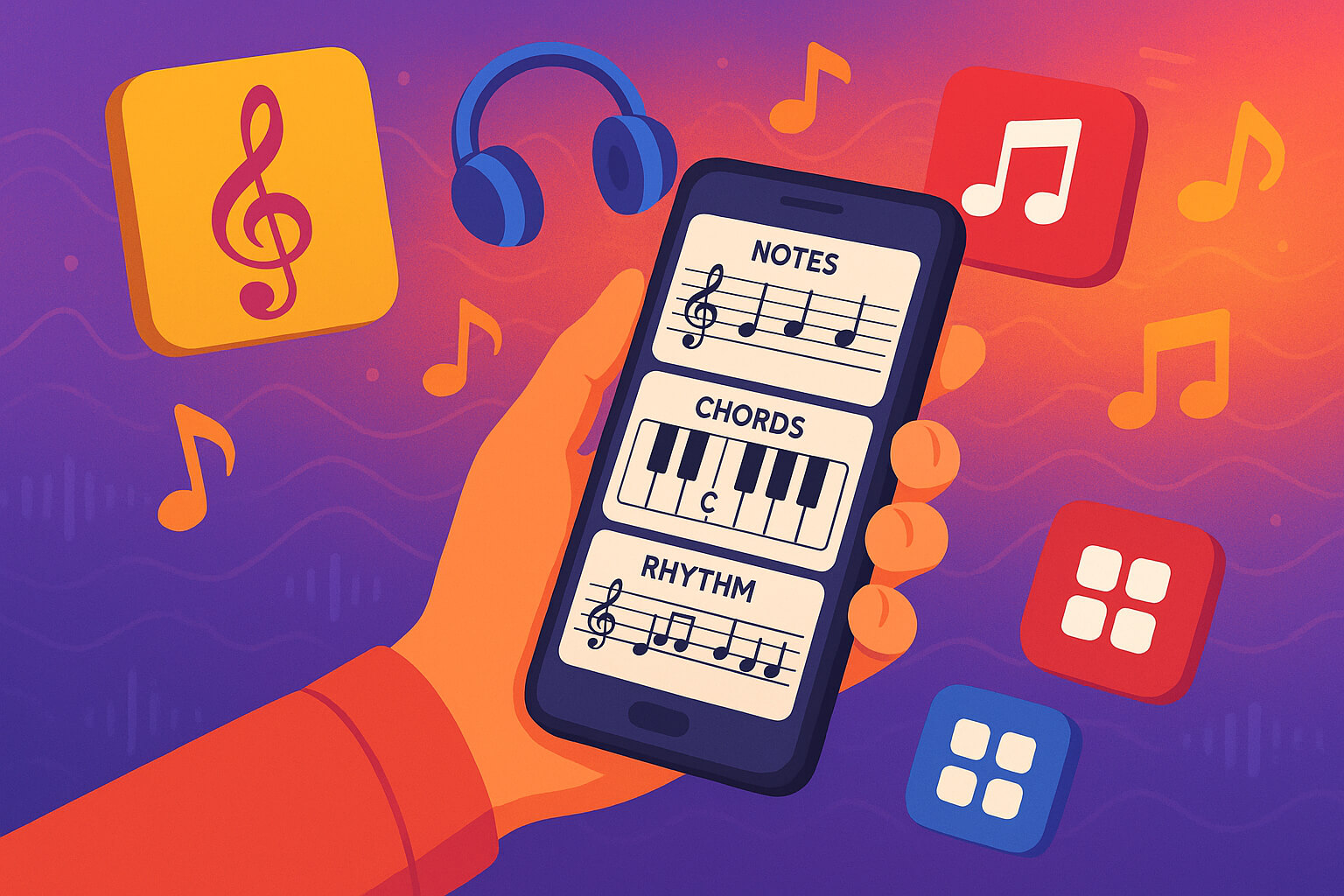Top 7 Free Apps for Learning Music Theory on the Go

Learning music theory doesn’t have to mean sitting at a desk with dense textbooks or formal lessons. Thanks to a new generation of intuitive mobile apps, you can now explore scales, chords, intervals, rhythm, and ear training — all from your smartphone or tablet. Whether you’re a complete beginner or a seasoned musician looking to sharpen your skills, these 7 free apps make music theory accessible, engaging, and portable.
1. Tenuto (iOS & Android)
- Best for: Ear Training & Sight Reading
- Tenuto is the companion app to the highly respected website musictheory.net. It includes a robust collection of interactive exercises designed to reinforce core music theory concepts. You can practice note identification on different clefs, build chords and scales, and develop your interval recognition skills. What sets Tenuto apart is its flexibility—each exercise can be customized based on your goals and instrument.
- Whether you're preparing for music exams or simply building stronger fundamentals, Tenuto is a solid all-in-one toolkit.
- Learn more
2. Perfect Ear (iOS & Android)
- Best for: Developing Relative Pitch & Rhythm Skills
- Perfect Ear offers a comprehensive suite of ear training, rhythm practice, and music theory lessons, making it one of the most versatile apps for aural development. Users can train their ears to recognize intervals, chords, and scales, as well as develop rhythm through tapping and timing exercises. It even includes melodic dictation and custom exercise creation.
- Its user-friendly interface and progressive learning system make it ideal for daily practice at any skill level.
- Visit website
3. Music Theory Helper (Android only)
- Best for: Quick Theory References & Flashcards
- For Android users looking for a lightweight, fast reference app, Music Theory Helper acts like a digital cheat sheet. It provides easy-to-understand explanations of topics like key signatures, intervals, scales, chords, time signatures, and the circle of fifths. The flashcard quizzes help reinforce knowledge efficiently.
- It’s especially useful for brushing up on core concepts during short breaks or before performances.
- Google Play Store
4. EarMaster (iOS & Android)
- Best for: Comprehensive Ear Training
- Used in music schools and conservatories, EarMaster offers a professional-grade ear training experience. It includes training modes for identifying intervals, chords, cadences, rhythms, and melodic dictation. The app tracks your progress and adapts to your skill level, making it ideal for serious learners who want to deepen their aural perception.
- With its visually intuitive interface and gamified features, EarMaster turns rigorous training into an enjoyable challenge.
- Official site
5. Complete Music Reading Trainer (iOS & Android)
- Best for: Sight-Reading Practice
- This app is all about reading music fluently. Whether you're learning treble, bass, alto, or tenor clef, it helps you become a faster reader with real notation exercises. It supports multiple instruments and custom difficulty levels, making it accessible for both beginners and professionals.
- The gradual increase in complexity means you’re always learning just outside your comfort zone—a great formula for progress.
- Explore the app
6. Theory Lessons by musictheory.net (iOS & Android)
- Best for: Structured Theory Lessons
- If you like organized, lesson-based learning, this app delivers structured instruction on everything from basic note values to advanced harmonic analysis. Each lesson is presented clearly with diagrams and visual aids, following a logical progression ideal for self-paced study.
- Great for learners who appreciate a curriculum-style format with no fluff—just solid theory education.
- Start learning
7. Functional Ear Trainer (iOS & Android)
- Best for: Contextual Listening & Functional Ear Training
- Unlike traditional ear training apps that focus on isolated intervals, this app helps you recognize notes and chords within a tonal context—an essential skill for improvisers, jazz musicians, and composers. You train your ear to recognize scale degrees as they relate to the tonic, helping you internalize harmonic functions naturally.
- It’s a more advanced approach, but extremely effective for understanding how music actually feels and moves.
- Get it on Google Play
Bonus Resources from RocketPages
While these apps are powerful on their own, combining them with in-depth guides and structured resources will help you progress even faster. RocketPages offers a range of music education content to deepen your understanding:
Conclusion
- Music theory isn’t just for the classroom anymore. With these free apps, you can make meaningful progress anytime, anywhere. Whether you're building your ear, decoding rhythms, or brushing up on notation, these tools transform idle moments into productive study sessions.
- Pair them with structured resources like those from RocketPages, and you’ll have everything you need to become a more confident, well-rounded musician—without spending a dime.
